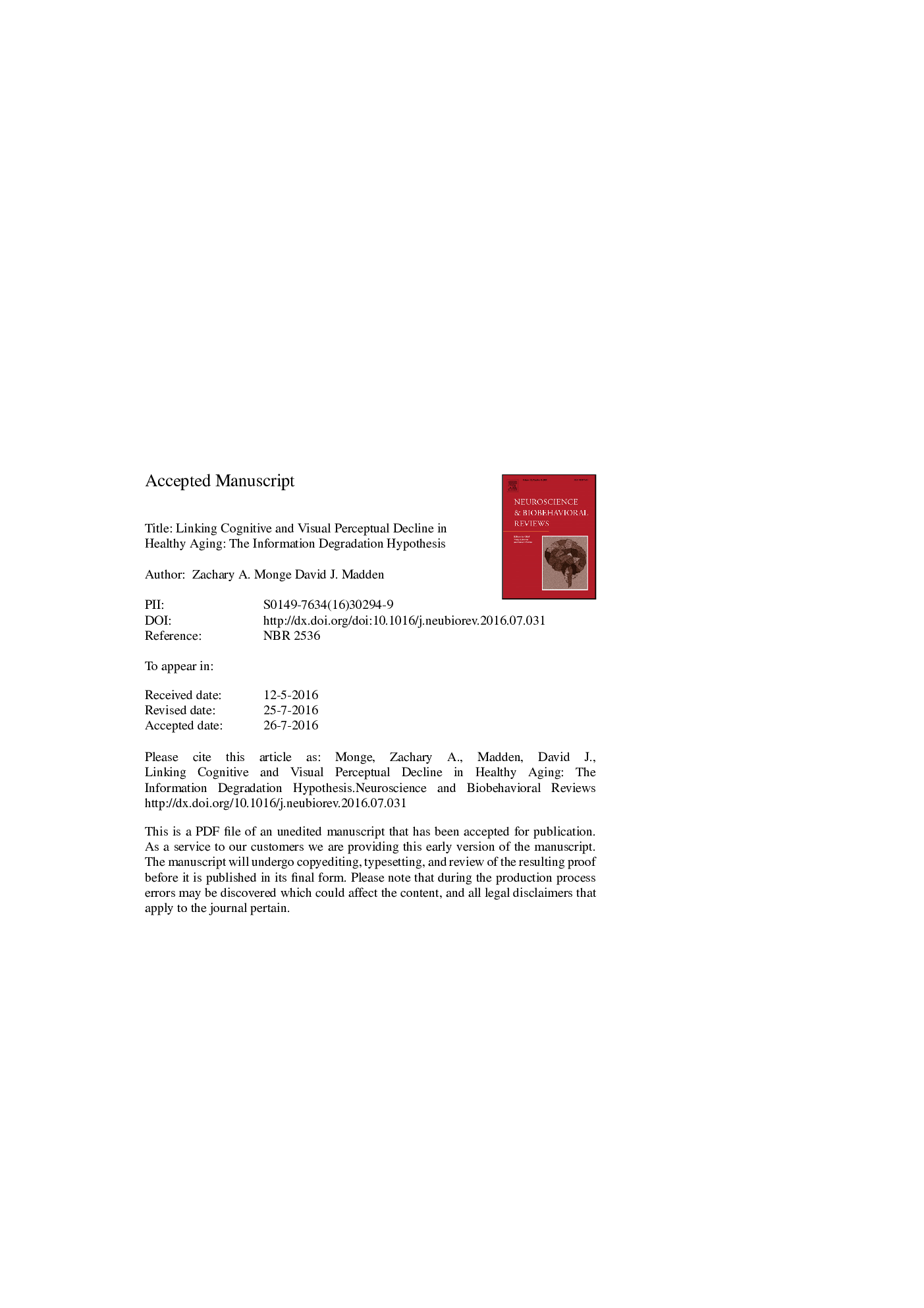| کد مقاله | کد نشریه | سال انتشار | مقاله انگلیسی | نسخه تمام متن |
|---|---|---|---|---|
| 7302741 | 1475301 | 2016 | 29 صفحه PDF | دانلود رایگان |
عنوان انگلیسی مقاله ISI
Linking cognitive and visual perceptual decline in healthy aging: The information degradation hypothesis
ترجمه فارسی عنوان
پیوند دادن ادراک شناختی و بصری در پیری سالم: فرضیه تضعیف اطلاعات
دانلود مقاله + سفارش ترجمه
دانلود مقاله ISI انگلیسی
رایگان برای ایرانیان
کلمات کلیدی
سالخورده، شناخت، تخریب اطلاعات، ادراک، چشم انداز، ادراک بصری،
ترجمه چکیده
چندین فرضیه تلاش می کنند رابطه بین کاهش شناختی و ادراکی در پیری را توضیح دهند (به عنوان مثال، علت مشترک، محرومیت حسی، بار شناختی بر ادراک، تضعیف اطلاعات). متأسفانه اکثر مطالعات قبلی بررسی این انجمن از تجزیه و تحلیل همبستگی استفاده کرده اند و اجازه نمی دهند که این فرضیه ها به اندازه کافی مورد آزمایش قرار گیرند. این مسئله همبستگی به ویژه برای فرضیه تخریب اطلاعات مرتبط است، که بیان می کند که ورودی های سیگنال ادراکی تخریب شده ناشی از هر فرایند های مرتبط با سن (مانند دژنراسیون شبکیه) یا دستکاری های تجربی (به عنوان مثال، کاهش کنتراست تصویری)، منجر به اشتباه در ادراک پردازش، که به نوبه خود می تواند فرآیندهای شناختی غیر فراتر از ادراک، فرایندهای شناختی بالاتر باشد. با وجودی که اکثر مطالعاتی که بررسی ارتباط بین ادراک شناختی و ادراکی مرتبط با سن دارند، همبستگی وجود دارد، ما چندین مطالعه را انجام دادیم که نشان می دهد که دستکاری های بصری بر عملکرد شناختی نوجوانان جوان و سالخورده تأثیر می گذارند، حمایت از فرضیه تخریب اطلاعات و متناقض با پیامدهای دیگر فرضیه ها (به عنوان مثال، علت مشترک، محرومیت حسی، بار شناختی بر ادراک). شواهد مورد بررسی نشان دهنده ضرورت بیشتر به بررسی فرضیه تخریب اطلاعات برای شناسایی مکانیسم های معکوس شناختی مرتبط با سن است.
موضوعات مرتبط
علوم زیستی و بیوفناوری
علم عصب شناسی
علوم اعصاب رفتاری
چکیده انگلیسی
Several hypotheses attempt to explain the relation between cognitive and perceptual decline in aging (e.g., common-cause, sensory deprivation, cognitive load on perception, information degradation). Unfortunately, the majority of past studies examining this association have used correlational analyses, not allowing for these hypotheses to be tested sufficiently. This correlational issue is especially relevant for the information degradation hypothesis, which states that degraded perceptual signal inputs, resulting from either age-related neurobiological processes (e.g., retinal degeneration) or experimental manipulations (e.g., reduced visual contrast), lead to errors in perceptual processing, which in turn may affect non-perceptual, higher-order cognitive processes. Even though the majority of studies examining the relation between age-related cognitive and perceptual decline have been correlational, we reviewed several studies demonstrating that visual manipulations affect both younger and older adults' cognitive performance, supporting the information degradation hypothesis and contradicting implications of other hypotheses (e.g., common-cause, sensory deprivation, cognitive load on perception). The reviewed evidence indicates the necessity to further examine the information degradation hypothesis in order to identify mechanisms underlying age-related cognitive decline.
ناشر
Database: Elsevier - ScienceDirect (ساینس دایرکت)
Journal: Neuroscience & Biobehavioral Reviews - Volume 69, October 2016, Pages 166-173
Journal: Neuroscience & Biobehavioral Reviews - Volume 69, October 2016, Pages 166-173
نویسندگان
Zachary A. Monge, David J. Madden,
